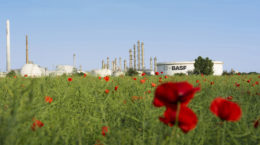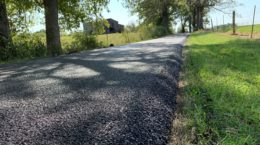While working with asphalt, safe handling is always a top priority.
Once the asphalt is modified with BASF’s B2Last bitumen additive, a reactive, isocyanate-based technology, the same standard safety procedures apply.
While isocyanates may not be a household name for most contractors, these components are in a variety of commonly used products in our everyday lives.
“Isocyanates are components for polyurethane-based foams like seat cushions; vibration dampeners in automotive applications; rigid foams like insulation in water heaters and coolers, says Mark McKinney, Business Segment Manager, Product Stewardship, BASF. “These components make thermoplastic polyurethanes for many different applications, like hard plastics for rollerblade boots or ski boots, flexible foams for running shoe soles and coatings on seeds and control-released fertilizers. They are very versatile.”
Since the 1950s, BASF has been a leading expert in manufacturing, using and designing reactive, isocyanate-based technologies. The B2Last bitumen additive is one of the newest additions to their portfolio.
“As a commitment to our customers, BASF recently announced a major expansion at one of its largest isocyanate production facilities based in the U.S.,”
“Isocyanates are primary building blocks for polyurethanes, which are manufactured and sold all around the world,” says Dr. Karl Gust, Marketing and New Business Development Manager, BASF. “While the application of isocyanates in asphalt innovation is new, we expect some questions from the industry because they haven’t used this technology before – for us, these technologies have a long successful history of use.”
Although some contractors might be hesitant using reactive, isocyanate-based additives, there is no need for concern as long as they follow standard safety procedures.
“B2Last reacts with the asphalt, is consumed during the modification process and essentially becomes part of the asphalt,” explains Brian Orr, Senior Asphalt Technologies, BASF. “At that point, any exposure concerns are significantly reduced.”
Since safety is a high priority at BASF, when it comes to the safe handling of the B2Last additive, customer training is just as important. BASF’s technical service teams work closely with customers by training their employees on proper material receiving and introducing B2Last into their asphalt processes.
“At the loading station, when opening the dome, we recommend wearing air-purifying respirators,” McKinney says. “These respirators are standard personal protective equipment (PPE) when receiving isocyanates and are very capable of filtering out any potential emissions. Afterwards, the only precautions would be PPE normally worn when handling hot asphalt – gloves, jackets, etc.”
Supply security
An additional benefit of using B2Last is global manufacture and a steady supply chain.
“As a commitment to our customers, BASF recently announced a major expansion at one of its largest isocyanate production facilities based in the U.S.,” says Dr. Gust. “This further demonstrates our commitment to the various markets that consume these components.”





